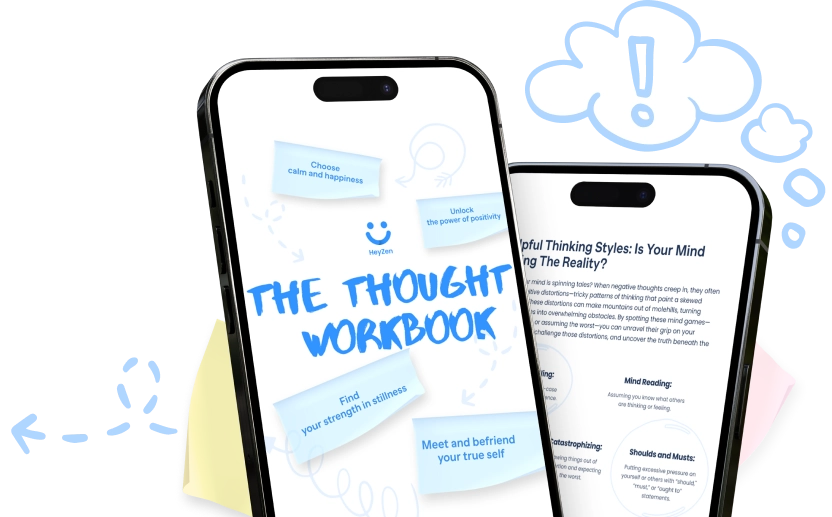ADHD and Binge Eating | How to Control & Understand

Do you often can’t stop eating even when you feel full? ADHD tends to coexist with other mental health conditions, and binge eating disorder is one of them. Often, understanding that you’re already full isn’t enough to curb the urge to overeat, and so we blame ourselves for the lack of willpower and, perhaps, feel guilty for yet another case of lack of self-control.
But there’s a way out of this, and the first step is to schedule an appointment with a mental health professional to get medical treatment or adjustments to your existing one. In the meantime, it’s important to understand why an ADHD brain may function in such a peculiar way. So, let’s explore what ADHD and eating disorders are and natural science-proven ways of overcoming the problem.
Key takeaways:
- ADHD is often diagnosed with other mental health conditions like anxiety, depression, and eating disorders.
- Binge eating is one of the most common eating disorders that is 4.13 more likely to develop in people with ADHD.
- Binge eating disorder is characterized by eating abnormal amounts of food to the state of uncomfortable fullness at least 1 day a week for 3 months.
- The reason for binge eating disorder in ADHD individuals may be poor impulse control, bad emotional regulation, and heightened reward response to food.
- Natural treatment options that help alleviate binge eating are psychotherapy, mindfulness, and exploring healthy sources of joy in hobbies and interests.
What is Attention Deficit Hyperactivity Disorder?
Attention deficit hyperactivity disorder (ADHD) is a neurodevelopmental disorder, the first symptoms of which are usually revealed before age 12 and affect functioning in more than one setting (work, school, communication with peers, etc.).
All causes of the disorder are still unknown, and it’s still under research. However, studies suggest that ADHD causes impairments in the structure and function of the brain (dopamine function, executive functioning like problems with working memory and impulse control, etc.).
The American Psychiatric Association (APA) recognizes three subtypes of ADHD: inattentive, hyperactive-impulsive, and combined, but the last one is the most commonly diagnosed and it includes the symptoms of both subtypes. Some common ADHD symptoms include:
- Inability to concentrate
- Forgetfulness
- Time-blindness
- Difficulty with controlling one’s impulses
- Constant fidgeting with objects and body parts.
Comorbidities of ADHD
ADHD is often diagnosed together with other mental health conditions not only because of the physiological predisposition but also because of the lack of healthy coping strategies and the right treatment. Often, people with the disorder:
- find it difficult to meet societal/parental expectations,
- suffer from low self-esteem,
- feel “not enough” as they try to perform the best compensating for their problems with inattention or memory,
- have problems with emotional regulation, i.e., adequately responding to external situations,
- struggle to stay at the present moment.
For these and neurodevelopmental reasons, ADHD is often diagnosed together with:
- Obsessive-compulsive disorder (OCD)
- Eating disorders (anorexia nervosa, bulimia nervosa, binge eating disorder, etc.)
- Anxiety disorders (generalized anxiety disorder, social anxiety, phobias, etc.)
- Depression
- Learning disabilities (dyslexia, auditory processing disorder, etc.)
- and others.
How to diagnose ADHD?
You can schedule an appointment with a psychiatrist, neurologist, or physician.
The first step of the medical ADHD diagnosis process is usually questionnaires and self-assessment tests, where both a patient and a subject analyze the persistence of symptoms, their effect on daily functioning, and their severity.
Later, a doctor will be able to identify if you have any comorbid conditions and recommend other health checks like blood tests, electroencephalogram (EEG), etc.
Eating disorders: what is it?
An eating disorder is a mental health condition characterized by disturbances in eating behavior and usage of food as a way of coping with feelings or emotions. There are three types of eating disorders:
Anorexia nervosa: minimizing food intake and excessive exercising in order to lose weight.
Bulimia nervosa: eating too much and purging to prevent weight gain.
Binge eating disorder: eating too much to the point of uncomfortable fullness.
In general, seriously consider consulting with a mental health professional if you:
- obsess over food and weight loss/gain
- avoid socializing while eating food
- eat very little or too much
- purge after eating
- stick to a very strict diet or eating routine
Binge eating disorder and ADHD
It’s one of the most common eating disorders that is 4.13 more likely to develop in people with ADHD, according to the study. The reason may be that people with ADHD have problems with impulse control, emotional regulation, and impaired dopamine functioning. A new research suggests that the problem isn’t in impulse control but in the heightened reward response specifically to food compared to non-ADHD people.
Symptoms of binge eating disorder
The diagnostic criteria for binge eating are described in DSM-V, a special psychiatric manual worked out by the American Psychiatric Association. According to it, one has to show some of the following signs to be diagnosed with the disorder:
- Eating within a specific period an abnormal amount of food and lacking self-control over how much one eats.
- Eating alone because of the embarrassment of how much one eats.
- Eating even when not hungry or eating to the point of uncomfortable fullness.
- It occurs at least 1 day a week for 3 months.
- Binge eating doesn’t only occur during anorexia or bulimia courses and doesn’t occur only after unhealthy compensatory behaviors, i.e., purging, fasting, etc.
It’s not an extensive list of binge eating patterns and symptoms, and only a mental health professional can objectively assess if you have the disorder or not. Remember that binge eating behavior can be a sign of many other conditions, so schedule an appointment with a medical professional to get help.
How to diagnose binge eating disorder?
- Schedule an appointment with a general practitioner (GP), who must refer you to an eating disorder specialist. In case they don’t, don’t hesitate to visit another GP who can recognize your problem and refer you to a specialist.
- Before the appointment, try to remember all the bothersome eating behaviors and your dietary habits to tell your doctor about. Also, ask people closest to you if they’ve noticed some abnormalities in your behavior and note them together.
- Sometimes, a doctor may not recognize your eating disorder or simply prescribe exercising or dieting. So, be honest and open about your experience to get appropriate treatment and start living a much more fulfilling life.
- While and in between the doctor appointments, start practicing psychotherapy, meditation, and other natural means to alleviate the symptoms of binge eating and ADHD. Make sure that the natural means of your choice are scientifically proven, as there are many unsafe and ineffective methods.
How to stop binge eating with ADHD
Psychotherapy
Usually, it’s prescribed together with medication or as a complementary treatment option by doctors. Most often, it’s cognitive-behavioral therapy (CBT) that is used to help people develop healthy coping strategies to manage binge eating. The main aim behind CBT techniques is to learn to control impulses by identifying the cues for binge eating and applying the new healthy behaviors in order to curb it:
- A cue can be a bakery on the way home, eating in front of a TV, or eating candy, i.e., it’s an action or an environmental stimulus that will make you binge.
- Then, you need to either restrict your exposure to those cues, avoid them altogether, or take a 15-minute pause between seeing the cue and feeling the urge to binge.
- Surround yourself with cues that support healthy eating behavior and make it easier to resist binging. For instance, try to eat in a calm, designated space, like a dining table, rather than in front of a screen, which can lead to mindless eating.
Aside from the tips above, CBT can help you not only work out healthy coping strategies but also understand the roots of your binge behavior and help you uncover the “why” behind it; you may be trying to manage certain uncomfortable emotions, process a troublesome event, or hide dissatisfaction with some life areas through this harmful habit.
Mindfulness
Mindfulness can help you become more aware of the sensations of hunger and fullness and the emotional triggers that lead to eating. This awareness can lead to reducing binge eating behavior, and here’s how you can practice mindful eating:
- Before eating, try to feel all the sensations of how hunger manifests in your body and “look into” the feeling of emptiness.
- During meals, take smaller bites and chew thoroughly to stay present. Engage all your senses while eating—notice the colors, smells, and flavors. This helps to build a stronger mind-body connection and can help reduce the need to binge.
- Throughout the whole process, don’t get distracted by phones, talks, or a TV, but stay fully focused on the food in front of you and its taste.
- Once you feel full, observe this feeling too and “look into” how fullness feels in your stomach. Assess if it’s pleasant, if you’re saturated, or if you should eat more or less.
Support system
Having a support system of friends, family, or support groups can make a big difference. Having people you trust can provide accountability, encouragement, and alternative coping mechanisms when you feel the urge to binge eat. You might also consider joining ADHD or binge eating support groups, in-person or online, where you can connect with others who are going through the same thing and share strategies.
Exploring your interests
Often, food occupies all our attention, and it becomes the only source of happiness in our lives. Explore other sources of positive emotions in your life and try out different leisure activities. It can be finding a crocheting group or getting a subscription to a gym—these will not only serve as a great source of joy but also as a means to meet new friends!
Remember, our brain always seeks easy feelings of happiness and excitement. So, think about your own alternative sources for it. You’ll be surprised to discover that there are many other activities that can spark genuine interest and pleasure, incomparable to a few packs of chips.
Is it possible to overcome binge eating?
You can definitely take control over your eating behavior by:
- listening to your body signals,
- practicing mindfulness,
- understanding what you’re trying to compensate for with binge behavior,
- finding hobbies and interests that will bring you twice as much joy as food.
All of it, together with proper medical treatment, will change your life and let you see food not as a source of joy or guilt but only as one of the parts of normal life.








